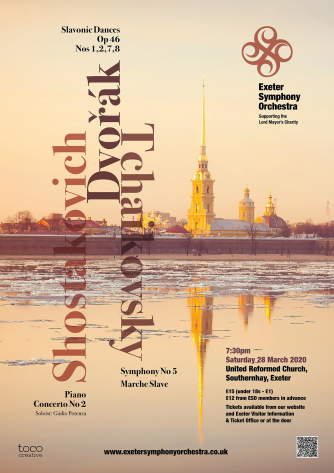Details
Southernhay United Reformed Church
Dix's Field
Exeter
Devon
EX1 1QA
England
Programme
Pyotr Tchaikovsky – Marche Slave, Op.31
Antonin Dvorak – Slavonic Dances, Op.46
Dmitry Shostakovich – Piano Concerto no.2 in F major, Op.102
~ Interval ~
Pyotr Tchaikovsky – Symphony no.5 in E minor, Op.64
Performers
Giulio Potenza – Piano
Arturo Serna – Conductor
Exeter Symphony Orchestra
Programme Note
Tchaikovsky's Marche Slave was commissioned by the Slavonic Charity Committee in order to support the army in the war against the Turks. The piece is a compilation of Serbian folk songs and for its climax Tchaikovsky cleverly introduces the National Anthem of Imperial Russia, 'God Save the Tsar', prophesying the triumph of the Slavonic people over tyranny.
,
Dvořák's Slavonic Dances Op 46 were inspired by Johannes Brahms’s own Hungarian Dances and were orchestrated at the request of Dvořák’s publisher soon after composition. The pieces, lively and overtly nationalistic, were well received at the time and today are among the composer’s most memorable works, occasionally making appearances in popular culture. We will be performing dances 1,2,7 and 8.
Shostakovich's Piano Concerto was dedicated to his son Maxim, when he was preparing to enter the Conservatoire. At the premiere on 10th May 1957 Shostakovich complained that the piece had no musical value but the critics loved it and defined the work as having charming simplicity, carefree spirit and lyrical warmth. It has a joke included in the last movement: the scales and the thematic material are similar to the loathed studies by Hanon that most pianists had to go through. Shostakovich transforms the boring scales into a masterful movement with flair, irony and a great sense of humour.
Into his 5th Symphony Tchaikovsky poured his purest and highest qualities as a composer. He dedicated the work to the elderly German teacher Theodor Avé-Lallement. The latter tried to convince Tchaikovsky to settle in Germany so he could overcome his "shortcomings as a composer". Tchaikovsky returned his compliment with this work that has it all - drama, poetry, sadness, fire, childish bursts of joy and maturity. The piece is perfect in every way and a stunning finale for this concert.

 Your events at Classical Events
Your events at Classical Events

